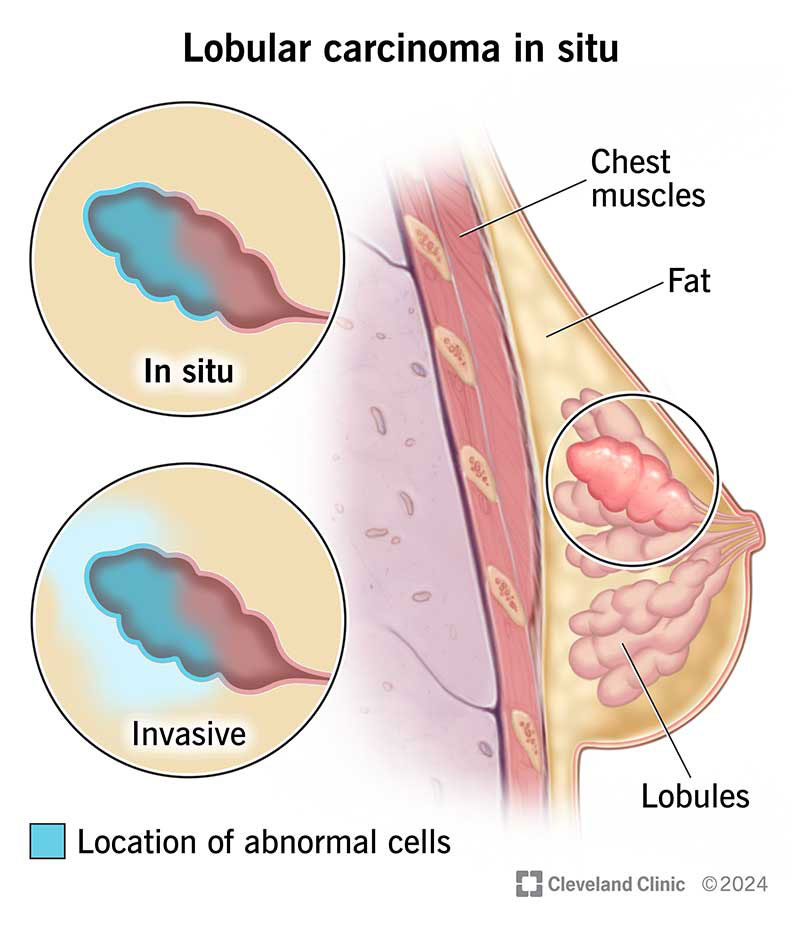Lobular carcinoma in situ (LCIS) is a rare breast condition. It causes abnormal cells in your lobules — the glands in your breasts that produce breast milk. LCIS isn’t breast cancer but it does increase the chance you’ll have breast cancer. Healthcare providers can treat the condition with medication. In some cases, they may recommend surgery.
Advertisement
Cleveland Clinic is a non-profit academic medical center. Advertising on our site helps support our mission. We do not endorse non-Cleveland Clinic products or services. Policy

Image content: This image is available to view online.
View image online (https://my.clevelandclinic.org/-/scassets/Images/org/health/articles/lobular-carcinoma)
Lobular carcinoma in situ (LCIS) is a rare condition that happens when you have abnormal cells in your lobules — the glands in your breasts that produce breast milk.
Advertisement
Cleveland Clinic is a non-profit academic medical center. Advertising on our site helps support our mission. We do not endorse non-Cleveland Clinic products or services. Policy
LCIS isn’t breast cancer even though its name includes the term “carcinoma” (cancer). The abnormal cells in your breast glands aren’t cancerous. They’re “in situ,” meaning they don’t become invasive cancer that’s spreading from your lobules to another part of your breast.
Having LCIS doesn’t mean you have a serious illness. But a diagnosis of LCIS does increase the chance that you’ll develop breast cancer later on.
Healthcare providers classify lobular carcinoma in situ by the way abnormal cells appear when viewed under a microscope:
No, it’s not. But how common it is varies based on sex. It affects between 4 and 11 per 100,000 females. It’s even less common in males, at 1 in 100,000.
LCIS may not cause symptoms. For example, some people learn they have breast cancer after finding a lump in their breast that a test shows is a cancerous tumor. Instead, healthcare providers typically detect LCIS while viewing results from a breast biopsy done for another reason.
Advertisement
Researchers know genetic mutations cause normal cells in your lobules to change into abnormal cells. But they don’t know what triggers the change.
While it doesn’t happen often, lobular carcinoma in situ may develop into ductal carcinoma in situ (DCIS) or lobular breast cancer. Studies show that 1 in 10 people with LCIS develop DCIS or lobular breast cancer. If you have LCIS, ask your provider to explain what you can expect.
If test results show abnormal cells in your lobules, your healthcare provider may order another biopsy to find and remove any other abnormal cells. A pathologist will examine abnormal cells under a microscope to identify the type of LCIS that you have.
Your treatment depends on the type of LCIS. For example, if you have classic LCIS, your healthcare provider may recommend active surveillance or preventive therapy. If you have pleomorphic or florid LCIS, you may need surgery.
Active surveillance involves regular follow-up examinations and tests. For example, your healthcare provider may do a breast examination every six months. They’ll probably recommend that you have a mammogram every year. They may recommend additional tests, like a breast magnetic resonance imaging (MRI) scan.
As the name implies, preventive therapy is a treatment intended to keep abnormal cells in your lobules from becoming cancerous cells. Medications may include:
If tests show you have pleomorphic or florid LCIS, your oncologist may recommend breast cancer surgery, including:
That depends on your situation, including the type of LCIS that you have. If you wonder what to expect, ask your healthcare provider to explain what’s going on in your breast and your treatment options. Understanding your options will help you feel more confident about your plan for living with LCIS.
Unfortunately, researchers don’t have enough information about LCIS to recommend ways to prevent it. But there are steps you can take to reduce your risk:
Advertisement
There’s a lot you can do to take care of yourself if you have LCIS, like eating well, getting regular exercise and avoiding beverages that contain alcohol. Here are some other suggestions:
Lobular carcinoma in situ is a rare condition that increases your risk of developing breast cancer. Understanding your risk and your options can help you feel more confident and in control of your situation. Here are some suggestions:
Advertisement
LCIS may not become invasive breast cancer, but it can happen. When it does, it can take 10 to 15 years to happen. Even so, treatment often cures invasive breast cancer that started as lobular carcinoma in situ. For example, one analysis of LCIS cases shows that 98% of people who had surgery to treat LCIS were alive 10 years after treatment.
The biopsy results are back with unexpected news: You have lobular carcinoma in situ (LCIS). Receiving an LCIS diagnosis doesn’t mean you’ll develop breast cancer. But it does mean you’re at risk for developing the condition. To be clear, there’s a 1 in 10 chance that will happen. If you have this condition, it may help to know about treatments that can reduce or eliminate your risk. And there are things you can do on your own. If tests show you have LCIS, your healthcare provider will take the time to explain your options and recommend programs and services.
Advertisement

Sign up for our Health Essentials emails for expert guidance on nutrition, fitness, sleep, skin care and more.
Learn more about the Health Library and our editorial process.
Cleveland Clinic’s health articles are based on evidence-backed information and review by medical professionals to ensure accuracy, reliability and up-to-date clinical standards.
Cleveland Clinic’s health articles are based on evidence-backed information and review by medical professionals to ensure accuracy, reliability and up-to-date clinical standards.
Lobular carcinoma in situ means you have a higher risk of developing breast cancer. Cleveland Clinic’s experts can help manage your risk with personalized care.
